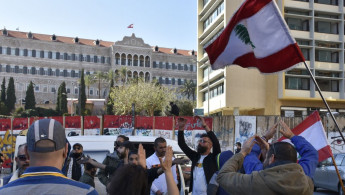Lebanese charity storms bank to free frozen funds from account
Commercial Banks shut in Lebanon on Tuesday in "solidarity" with the Swiss Lebanese Bank after three of its employees were injured by protesters who stormed a Beirut branch on Monday.
The Swiss Lebanese Bank issued a statement saying that 100 men occupied a branch in the Beirut neighbourhood of Hamra on Monday and forced employees to transfer a sum of money to Turkey under the threat of violence. Three employees were injured in the process, one of whom was in the hospital suffering from facial fractures, the bank said on Monday night.
Mohamed Beydoun, the president of local NGO Banin Charity, which stormed the bank on Monday, denied that any bank employees were injured.
Beydoun said that Lebanese soldiers were inside the building throughout their five-hour "occupation" and would have intervened if protesters used violence against bank employees. He claimed that the bank's accusation of assault was made to discourage people from emulating Banin and occupying other banks throughout Lebanon.
Lebanon's general prosecutor called Beydoun and his brother, Jad Beydoun, to his office on Tuesday under charges of assault and breaking and entering.
Banin occupied the bank in attempt to withdraw charitable funds frozen in its account, Mohamed Beydoun told The New Arab. The raid succeeded, with the bank manager complying with the charity's demands by wiring $180,000 to a hospital in Turkey.
The frozen funds were collected by Banin to pay for the surgeries of four patients, but had been frozen in the bank for over a year and a half, due to withdrawal limits imposed on Lebanese depositors during the banking crisis of fall 2019.
Banin went to court to attempt to get the bank to release the funds, but their request was denied by a judge.
"When you have the government against you, and when you have the judge against you, you can only use force—it’s the only way to get back your money," Beydoun said.
The Swiss Lebanese Bank said that Banin's account had been closed in accordance with two circulars issued by Lebanon’s central bank, which allow banks to close accounts to comply with US anti-terror financing and anti-money laundering legislation.
Incidents of social unrest are now commonplace across Lebanon and are increasing in frequency as the economy continues its death spiral. A June World Bank report described Lebanon's economic crisis as one of the "top 3 most severe crises episodes globally" to occur since the 1850s.
The value of the Lebanese lira has plummeted in recent months, losing over 90% of its value since autumn 2019. At the same time, prices of basic goods have shot up, as a weak lira makes importing foreign goods increasingly expensive.
State subsidies are also slowly being lifted as Lebanon's foreign reserves run dangerously low—threatening to further push basic goods like fuel, bread and medicine, out of reach for vast swathes of Lebanon's residents.
Lebanon's banks are set to allow certain depositors to start withdrawing $800—half in US dollar notes and half in the equivalent value of lira at a variable exchange rate—monthly from banks starting on July 1. Though the decision will allow some depositors to access much-needed cash, it could further deplete the already-low foreign reserves available in Lebanon's coffers.





 Follow the Middle East's top stories in English at The New Arab on Google News
Follow the Middle East's top stories in English at The New Arab on Google News


